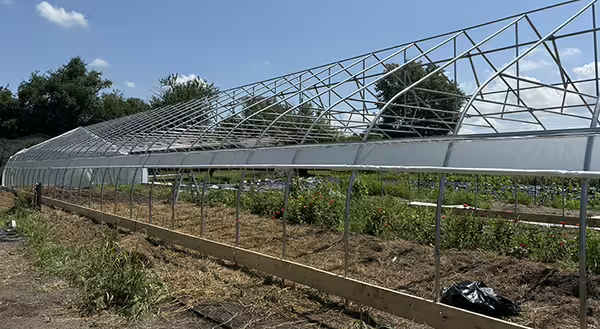
In early August, local farmer Kyan Glen of The Table Farm and Workshop asked me to join a volunteer crew in assembling his new high tunnel. I said yes immediately— Any excuse to get out of the office, work alongside producers, and soak in the seasonal weather is a good one.
Glen’s farm was selected to receive Environmental Quality Incentives Program (EQIP) funding this year for a second high tunnel through the Natural Resources Conservation Service (NRCS) office in Bloomington.
“I had a very pleasant experience working with our local NRCS office—they have a great staff,” Glenn said.
EQIP grants pay farmers to add environmental protection enhancements on their farm, such as high tunnels. High tunnels sit between high-tech greenhouses and low-cost hoophouses in terms of technology, cost, and benefits. Commercial crop production under these structures – broadly referred to as protected culture – can shield crops from heavy, eroding rain and wind, which results in less soil and nutrient runoff from the area.
High tunnels work by capturing solar radiation under clear, infrared-retentive plastic, and in turn warming the air and soil. On a mid-March morning, Illinois field soil might be 40°F, while soil inside a high tunnel can be over 55°F. This also allows growers to plant earlier in spring and harvest later into fall than they could in open fields.
Kyan succinctly described the versatility and many benefits of high tunnels. “For commercial growers, high tunnels give more environmental control. Crops get consistent water regimens through drip irrigation instead of rain, experience less wind damage, and enjoy filtered sunlight, etc. When we have 1-2” rains in an hour, field crops can drown, tomatoes can split. Not under a tunnel, though.”
Glen pulled the final tomatoes off the vine in early December last year in his first tunnel. “That tomato was planted three weeks earlier than a field tomato and yielded six weeks longer. That’s more than two additional months of growth, harvests, profits.”
When I arrived on build day, Tomm Becker of Nifty Hoops and the volunteer crew were installing electrical boxes, wiring, and the tunnel plastic. As we worked, I learned more about Nifty Hoops’ mission from Tomm.
“We’re based in Ann Arbor, Michigan, but travel all over, leading tunnel builds,” Becker said. Buyers can opt for a “community build” package, where Nifty Hoops staff direct the process from start to finish. Glenn said, “the community build is 110% worth the extra cost.”
Becker came to Nifty Hoops after years of full-time vegetable farming and firsthand experience with high tunnel benefits of season extension, heat retention, and environmental control.
Nifty Hoops products are made with high-quality American steel, available in multiple sizes, and assembled in southeast Michigan. They are one of many NRCS-approved vendors for EQUIP grants, and several central IL farms have worked with them.
Becker shares, “Spring through fall, people make amazing connections with local farmers, learn to eat, and shop differently. Then cold weather comes, the farmer closes shop, and shoppers go back to big box stores for six months. We’re working to close that loop and keep people buying from their local farmers year-round.”
Last winter, I bought spinach, carrots, and turnips from Epiphany Farms Estate (Downs) in December, and lettuces from Down at the Farms (Fairbury) in February—all made possible by high tunnel production in Illinois. Speaking for myself, there’s no contest between fresh, local produce in fall, winter, and spring—when available—and bland, micronutrient-poor store produce.
“Exactly!” Becker said. “More high tunnels in Illinois means more produce grown earlier in spring and later into fall—even winter. Season extension tools like high tunnels are the only way we move toward a more robust, secure, year-round local food economy.”
Within two hours, we finished the electrical work and added the plastic covering. After completing this work, I left Kyan’s farm feeling energized by the idea of more local food availability in the shoulder seasons in our area.
WRITER: Nick Frillman Local Foods and Small Farms Educator, University of Illinois Extension
ABOUT EXTENSION: Illinois Extension leads public outreach for University of Illinois by translating research into action plans that allow Illinois families, businesses, and community leaders to solve problems, make informed decisions, and adapt to changes and opportunities.